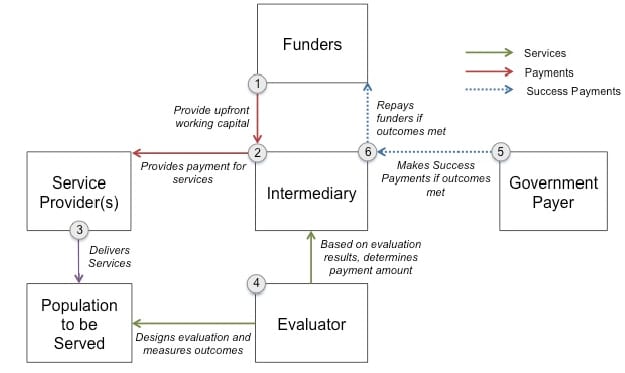Pay for Success and Social Impact Bonds
Pay for Success (PFS) is an innovative funding model that drives government resources toward social programs that prove effective at providing results to the people who need them most. PFS gives highly effective service providers, including nonprofits and charities, access to flexible, reliable, and up-front resources to tackle critical social problems by tapping private funding to cover the up-front costs of social programs.
Across the United States, communities continue to grapple with a daunting array of complex social problems, such as high rates of crime, homelessness, and chronic disease. In these communities, social service providers, many of which are nonprofits, have developed innovative programs that can make measurable progress toward solving these problems while generating social and financial benefits.
Even though we expect government to play a core role in providing social services, governments face challenges maintaining funding for their current programs and obligations, making it difficult for leaders to consider investments that scale high-quality social programs. For certain issue areas, PFS can provide governments and social service providers with the flexibility that they need to explore and expand programs that are focused on measurable outcomes.
Third Sector believes Pay for Success projects have the potential to:
- Measurably improving the lives of people most in need;
- Develop a more rigorous, outcomes-focused, and sustainable way to address social challenges in our communities;
- Support scaling of evidence-based practices by the public and nonprofit sectors; and
- Increase government accountability by directing government resources and funding toward effective programs that actually improve lives.
Pay for Success helps provide:
- Underserved individuals with the highest-quality supports that they need to thrive;
- Social service organizations with the stability of upfront, flexible funding that enables them to scale and focus on delivering proven, outcomes-focused services;
- Governments with the flexibility to support preventive services that lead to reduced costs and better outcomes in the long term;
- Taxpayers with the security of knowing that government resources are directed toward programs that produce demonstrated results for society; and
- Funders with the opportunity to put their capital to work in service of society.
Pay for Success Mechanics
Pay for Success projects require government, service providers, and funders to agree on targeted outcomes for a societal issue. Government and project partners then enter into a multi-year contract, in which the government agrees to make success payments if targeted outcomes are achieved.

Upon launch, a Pay for Success project follows the mechanics below, as detailed in the contract:
- Private and philanthropic funders provide the necessary up-front capital to fund the Pay for Success project and service delivery to an intermediary
- The intermediary disburses payment to the service provider for service delivery
- One or more service providers deliver the social intervention.
- An independent evaluator monitors outcomes against agreed-upon benchmarks and reports to project partners on evaluation results
- Based on evaluation results, government makes success payments only if targeted social outcomes are achieved
- Success payments are then used to repay funders and/or reinvest in the project.
